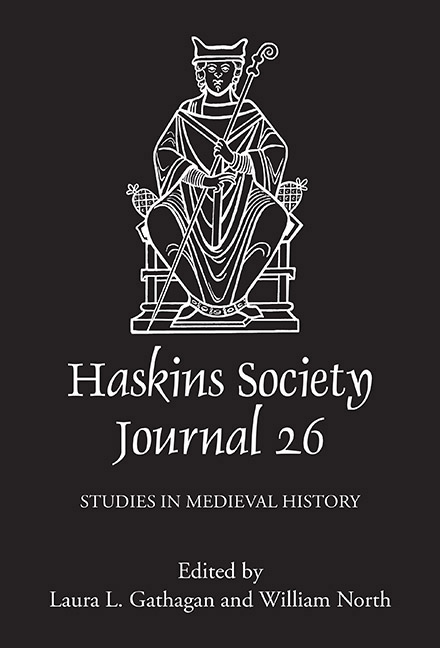Book contents
- Frontmatter
- Contents
- List of Figures
- Editors’ Note
- Abbreviations
- 1 Mores Tuos Fabricae Loquuntur Building Activity and the Rhetoric of Power in Ostrogothic Italy
- 2 A Hermeneutical Feast: Interreligious Dining in Early Medieval Conciliar Legislation
- 3 A Hypothetical Slave in Constantinople: Amalarius’s Liber Officialis and the Mediterranean Slave Trade
- 4 Welsh Kings at Anglo-Saxon Royal Assemblies (928–55)
- 5 The Diplomatics of Depredation: Reconsidering Holy Trinity Caen’s List of Losses
- 6 When Did Robert of Torigni First Receive Henry of Huntingdon’s Historia Anglorum, and Why Does It Matter?
- 7 A Coin Bearing Testimony to Duchess Matilda as Consors Regni
- 8 Fighting to be the Tallest Dwarf: Invidia and Competition in the Self-Conception of Eleventh- and Twelfth-Century Masters
- 9 Brut y Tywysogion: the History of the Princes and Twelfth-Century Cambro-Latin Historical Writing
- 10 The Use of English Annalistic Sources in Medieval Welsh Chronicles
- 11 A Franco-Danish Marriage and the Plot against England
3 - A Hypothetical Slave in Constantinople: Amalarius’s Liber Officialis and the Mediterranean Slave Trade
Published online by Cambridge University Press: 25 May 2021
- Frontmatter
- Contents
- List of Figures
- Editors’ Note
- Abbreviations
- 1 Mores Tuos Fabricae Loquuntur Building Activity and the Rhetoric of Power in Ostrogothic Italy
- 2 A Hermeneutical Feast: Interreligious Dining in Early Medieval Conciliar Legislation
- 3 A Hypothetical Slave in Constantinople: Amalarius’s Liber Officialis and the Mediterranean Slave Trade
- 4 Welsh Kings at Anglo-Saxon Royal Assemblies (928–55)
- 5 The Diplomatics of Depredation: Reconsidering Holy Trinity Caen’s List of Losses
- 6 When Did Robert of Torigni First Receive Henry of Huntingdon’s Historia Anglorum, and Why Does It Matter?
- 7 A Coin Bearing Testimony to Duchess Matilda as Consors Regni
- 8 Fighting to be the Tallest Dwarf: Invidia and Competition in the Self-Conception of Eleventh- and Twelfth-Century Masters
- 9 Brut y Tywysogion: the History of the Princes and Twelfth-Century Cambro-Latin Historical Writing
- 10 The Use of English Annalistic Sources in Medieval Welsh Chronicles
- 11 A Franco-Danish Marriage and the Plot against England
Summary
I think to myself that there is no institution of the church, either among the ancient or the modern fathers, which does not possess some inner purpose.
These, as it turned out, were dangerous thoughts. Amalarius of Metz, born in the later eighth century and dead by circa 850, became one of the most controversial exegetes of the Carolingian Renaissance. This widely-traveled intellectual set out to interpret church services as if they were books of the Bible. His efforts did not please all of his contemporaries. ‘I would rather slice right off the three fingers with which I write than confirm these errors with the signature of my hand,’ wrote one. ‘Vague,’ ‘mad,’ ‘imprecise,’ scrawled another. ‘You are lying with your wicked teaching’. Later medieval readers complained about Amalarius's gnarly style, even as they praised his insights. ‘It may be that someone has written about these things more elegantly,’ wrote William of Malmesbury, ‘but truly no one has written with greater learning.’
As for modern medievalists, we have reason to be grateful to the man who thought that everything in the liturgy had a deeper explanation. Amalarius is one of the great over-explainers of the early Middle Ages. His exuberant analysis of the liturgy sheds light on a surprisingly broad range of contemporary phenomena, including the subject of this paper, the ninth-century Mediterranean slave trade. This study will begin by providing some indispensable background on Amalarius and his exegetical method, then it will attempt to untangle some of the knots in his less-than-lucid prose. Finally, it will draw a few conclusions about early medieval slavery from an imaginary, abstruse, but also – or so I wish to argue – illuminating little story that Amalarius tells about the difference between the alleluia and the tract.
Amalarius, usually called ‘of Metz’, must have been an impressive young man. He may have been a student of the Anglo-Saxon sage Alcuin at Tours or at the palace school. In youth he received good training, which left its mark on his striking Latin style. Around 809, Charlemagne (r. 768–814) appointed him to Trier, one of the great northern archbishoprics. Four years later the emperor chose him as an ambassador to Constantinople.
- Type
- Chapter
- Information
- The Haskins Society Journal 262014. Studies in Medieval History, pp. 47 - 68Publisher: Boydell & BrewerPrint publication year: 2015

